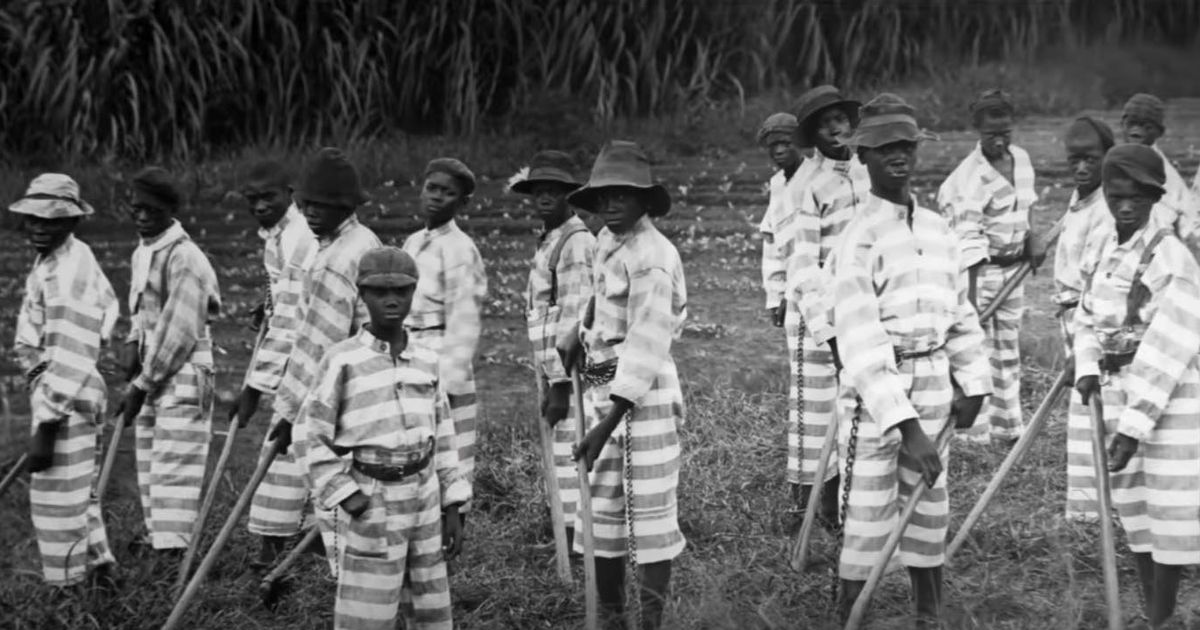Ava DuVernay did the near impossible with Selma: she made an emotionally complex movie about Martin Luther King Jr. without resulting to outright simplistic hero worship, making the movie that much richer. Riding the wave of that masterpiece, she decided to go broader in her historical study, and shift genres to documentary. 13th sees Ava play it more calculated and direct, seething with understated righteous anger as she shows what has happened to black in the United States since the abolition of “slavery.”
Why is slavery in quotes you say, since it was abolished with the 13th Amendment? That’s where DuVernay did her homework. The language of the 13th Amendment is:
“Neither slavery nor involuntary servitude, except as a punishment for crime whereof the party shall have been duly convicted, shall exist within the United States, or any place subject to their jurisdiction.”
DuVernay, like a sniper, lasers in on the exception in the amendment about punishment for crimes, and slowly paints the picture of how sinister, power grabbing politicians from both parties exacerbated and exploited this loophole to gain political points, and ya know, incarcerate a record amount of Americans of the African persuasion.
Ava’s sniper must also have been a history teacher. Starting from the ratification of the 13th Amendment, she highlights the many evolving instances of how criminalization was used to keep black people enslaved. We start with the slave patrols: that’s overt an obvious though. Once Civil Rights made overt discrimination and racism unpopular, Politicians got more sinister with their tactics. Richard Nixon and Ronald Reagan employed the “Southern Strategy,” a covert way to woo white Southern Democrats to the Republican party with buzzwords like “state’s rights” and “law and order.” Even I think that sounds good; but underneath those slogans are sinister policies like removing voting rights by criminal convictions, creating the “war on drugs,” and militarizing the police force with gigantic budgets. By using their state’s rights, governors could send the police into whatever areas they think had the most drugs, and wouldn’t you know it, that’s the perfect recipe to arrest an escalating amount of people, most of whom happen to be black. With the Clinton’s we get “mandatory minimums,” and escalating corporate power, which then starts to turn criminalizing black people into a profit driver, like say, slave owners did with their cheap labor. If that weren’t litigious enough, the “moral high ground” could now be justified by everyone in power because all these black “criminals” did something bad in society that they had very little say in crafting because of all the political tools stacked against them.
As you can see, this is a history lesson more than a story. 13th kind of just stops at the end, not trying to show how more people of color are being elected and shaping laws or other solutions being worked on. However, it is an extremely well told history lesson I would have loved in a high school or college lecture. DuVernay uses time as her propulsive engine, and builds in all the documentary tricks: various talking heads (including a brave member of a conservative bill writing political organization, whom DuVernay edits into humiliation), old clips using people’s words against them humorously and righteously, and music – specifically, rap – interludes, driving home her themes through pop culture. DuVernay’s best creative contribution is keeping the growing tally of imprisoned people in the United States as these policies get enacted. That simple ticker drives home her point simply and powerfully and made my eyes pop out everytime.
13th has made it easy to teach American history for teachers everywhere. 100 minutes for 100+ years of “freedom,” with no easy way to escape because of all the forces against enslavement of blacks in the United States. The Land of the Free.

